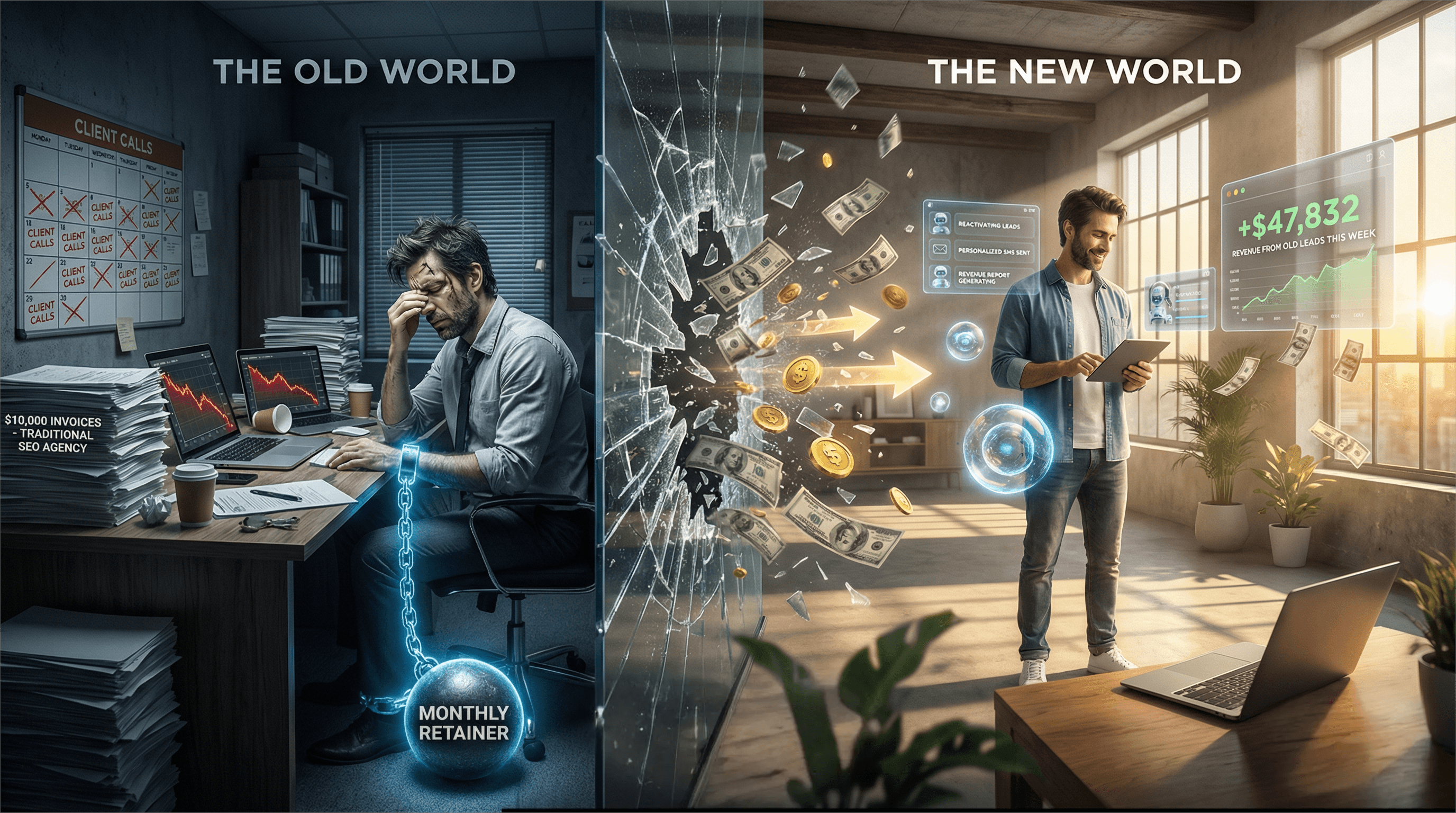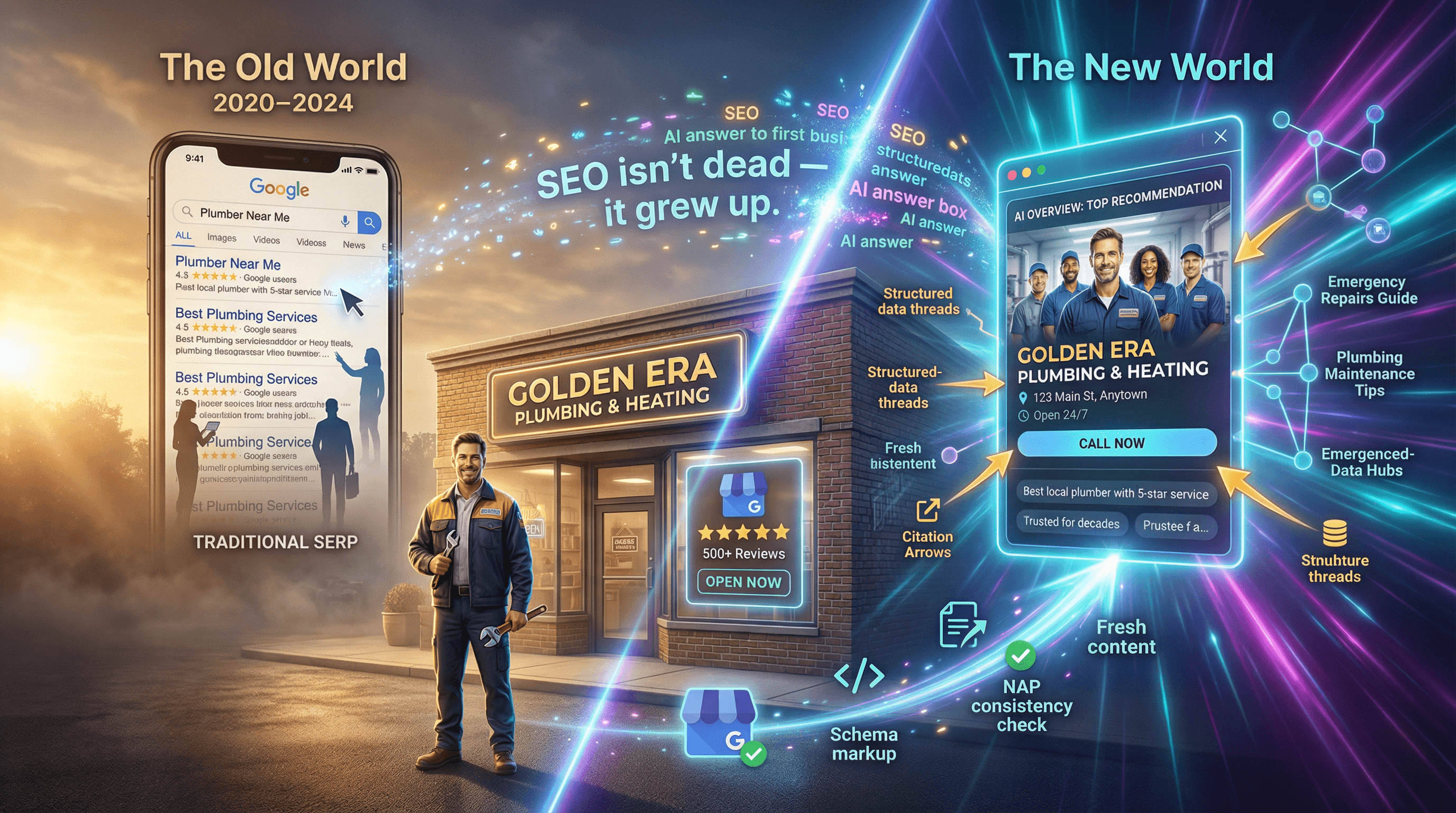Growth Partner
Discover why Growth Partners succeed where agencies fail in founder-led businesses. Learn strategies for scalable growth and building internal expertise.
Many agencies start with a founder's vision, but as they grow, that same founder can become the main roadblock. Agencies often bring in outside sales help, thinking that's the key to scaling. But more often than not, this approach misses the mark, leading to missed opportunities and stalled growth. A dedicated Growth Partner, however, focuses on building internal capabilities and systems, creating a sustainable path forward where agencies often falter.
Key Takeaways
Founders often get stuck doing sales themselves because they haven't built clear systems, making it hard to hand off the process.
Instead of hiring salespeople, it's better to train people already in the agency who understand the services and can learn sales skills.
Getting the discovery phase right is super important; if you miss things here, the deal might fall apart later.
A structured sales process, like one that covers qualification, discovery, strategy, and closing, helps win more deals.
Founders should still be involved in key client relationships or strategic moments, even when they're not doing day-to-day sales.
Why Growth Partners Excel Where Agencies Stumble

It’s a common story: an agency starts with a couple of founders who are great at what they do, and they land clients through sheer hustle and talent. Things are going well, maybe even great. But then comes the growth phase, and suddenly, the very people who built the business become the biggest roadblock. This is where dedicated growth partners often shine, stepping in where agency founders, despite their best intentions, start to falter.
The Founder's Dilemma: From Visionary to Bottleneck
Founders are often the heart and soul of their agency. They have the vision, the passion, and usually, the initial sales chops. But as the business grows, the founder can become the single point of failure. They're so involved in the day-to-day, especially in sales, that no one else can do it quite the same way. It’s not necessarily ego; it’s often a lack of clear systems for how sales actually work. Without codifying that process, it’s impossible to hand off effectively.
Founders get stuck because their sales process lives entirely in their head. They haven't broken it down into repeatable steps that someone else can follow.
The Critical Need for a Unified Leadership Vision
When multiple founders are involved, a lack of clear leadership can be a silent killer of growth. If everyone thinks they're in charge, or if decisions aren't made decisively, it creates confusion and slows everything down. A growth partner can help establish who leads what, ensuring everyone is pulling in the same direction. This alignment is key, especially when transitioning from a small, nimble team to a larger, more structured organization.
When Partnership Dynamics Hinder Growth
Sometimes, the very relationships that started the agency can become a drag on growth. If partners aren't aligned on the vision for scaling, or if one partner wants to maintain the status quo while others want to push forward, it creates friction. This can manifest in disagreements over investment, hiring, or strategic direction. A growth partner can act as an objective third party, helping to mediate these dynamics and keep the focus on the shared goal of expansion.
The Strategic Advantage of a Dedicated Growth Partner
When agencies hit a certain size, often around the 25-80 employee mark, founders can find themselves in a tricky spot. They've built something great, but the very things that made them successful initially can become roadblocks to scaling further. This is where a dedicated growth partner really shines, offering a different approach than a typical agency might.
Beyond Sales: Systemizing for Scalable Growth
Many founders get stuck because their sales process is all in their head. They're good at it, but they haven't written it down or built systems around it. This makes it tough to hand off to someone else. A growth partner focuses on taking that founder's knowledge and turning it into repeatable processes. Think about it: if your entire sales strategy lives and dies with one person, how can you possibly grow beyond what they can personally handle? The goal is to build a machine, not rely on a single star player. This means documenting everything from how you qualify leads to how you close deals, making it easier to train new team members and maintain consistency.
Leveraging Internal Talent for Sales Success
Instead of just hiring an outside sales person who doesn't understand the agency's delivery side, a growth partner looks at building sales capability from within. This often means mentoring existing team members who already know the agency's services inside and out. They focus on developing strategic thinking and presentation skills, rather than just pure sales tactics. This approach builds a stronger, more knowledgeable sales force that understands the nuances of what the agency actually does. It's about cultivating talent that can speak the language of both sales and service delivery.
The Power of a Structured Sales Framework
Agencies often stumble because they lack a clear, structured way to manage the client acquisition journey. A growth partner introduces frameworks that break down the sales process into manageable stages. This could look something like:
Discovery: Really digging deep to understand client needs.
Proposal: Crafting solutions that directly address those needs.
SOW Creation: Clearly defining project scope and deliverables.
Delivery Handoff: Ensuring a smooth transition to the project team.
Without a clear framework, it's easy for crucial details to slip through the cracks, leading to lost deals or unhappy clients down the line. Having these steps defined helps everyone stay on the same page.
This structured approach helps avoid common agency pitfalls, like presenting without asking questions or failing to properly qualify leads. It’s about building a predictable and effective way to bring in new business, which is key for sustainable growth. If you're looking to scale, understanding how to build these internal capabilities is a big part of making that transition.
Building Internal Expertise: The Growth Partner Approach
Agencies often get stuck because the founder is the only one who really knows how to sell the services. This is a big problem when you want to grow. Instead of hiring outside sales folks who don't know your business, a growth partner helps you build sales skills from the people already there.
Cultivating Sales Acumen from Within
It makes more sense to train people who already understand what your agency does. Think about your account managers or project leads. They know the services inside and out. The trick is teaching them the business side of things. This means showing them how to talk to potential clients, understand their needs, and explain how your agency can help. It's about turning delivery experts into sales experts.
Mentoring for Strategic Presentation Skills
Sales presentations shouldn't be a one-way street. A good presentation involves asking questions and listening. Growth partners train your team to do just that. They learn to ask questions every few slides to check for understanding and keep the client engaged. This makes the client feel heard and helps tailor the pitch to their specific situation. It’s not about reciting features; it’s about solving problems.
The Value of Service Knowledge in Sales
When someone who knows your services well talks to a client, it’s different. They can speak with real confidence about what your agency can achieve. They understand the nuances and can answer tough questions on the spot. This builds trust much faster than someone just reading from a script. It shows the client you have real people who know their stuff, not just a sales pitch.
The best way to get your team selling is to teach them the business side of what they already know. Don't hire a salesperson and then try to teach them your services. Teach your service people the sales process.
Here’s a look at how internal training can work:
Identify Potential: Look for team members who are good communicators and think strategically.
Structured Training: Provide clear steps and practice sessions for sales calls and presentations.
Ongoing Support: Offer regular feedback and coaching to help them improve.
Measure Progress: Track how well they are doing and adjust the training as needed.
Mastering the Client Acquisition Journey
Effective Lead Qualification Strategies
Getting the right clients in the door is half the battle. It’s easy to get excited about any potential business, but not every lead is a good fit. A solid qualification process acts like a filter, saving you time and resources. Think about creating a simple scorecard. This could look at things like budget alignment, the client's actual need for your services, and whether they seem like someone you can build a good working relationship with. If a lead doesn't hit certain marks, it’s okay to politely pass. This isn't about being picky; it's about focusing your energy where it counts.
The Art of Deep Discovery Calls
This is where many agencies stumble. A discovery call shouldn't be a presentation of what you do. Instead, it's about asking questions – lots of them. You need to understand the client's world, their biggest challenges, and what success looks like for them. The most successful deals often hinge on how well you uncover the client's top priorities during this stage. Aim to identify the top three things they absolutely need to fix or achieve. If you miss this, your entire pitch will be off the mark.
A common mistake is talking too much and asking too little. You want to create a conversation, not a monologue. Asking open-ended questions every few minutes keeps the client engaged and gives you the information you need.
Crafting Compelling Strategy Presentations
Once you've done your discovery, you know what the client cares about. Your presentation should directly address those points. Forget generic slides about your company history. Instead, focus on how your services solve their specific problems and help them reach their goals. Show them you understand their situation and have a clear plan. This means tailoring your message, using examples that relate to their industry, and clearly outlining the benefits they can expect. It’s about building a bridge from their current state to their desired future state, with your agency as the guide.
Avoiding Common Pitfalls in Agency Expansion
The Danger of Hiring Sales-Only Expertise
Lots of agencies think the quickest way to boost sales is to just hire a seasoned salesperson. It sounds logical, right? Someone who knows how to close deals. But here’s the catch: most agencies aren't selling widgets; they're selling complex services. A salesperson who's great at selling cars might not understand the nuances of digital strategy or how to talk to a client about their specific business challenges. This often leads to a disconnect. The salesperson might close a deal, but if they don't truly grasp what the agency delivers, the client's expectations can get misaligned from the start. This can create problems down the line, making delivery harder and client satisfaction suffer.
The Cost of Neglecting Foundational Processes
When an agency is small, it's easy to get by on informal processes. The founder knows everything, and communication happens by osmosis. But as you grow, this breaks down fast. Think about it: if your project management isn't solid, or if there's no clear system for how client work gets done, you're setting yourself up for trouble. You might land a big client, but if you can't deliver consistently, that revenue won't last. It’s like building a house without a proper foundation – it looks okay for a while, but it’s bound to crumble.
Lack of standardized client onboarding: Leads to inconsistent client experiences.
Unclear project workflows: Causes delays, missed deadlines, and team confusion.
No central pipeline management: Makes it hard to track leads and forecast revenue accurately.
Trying to scale without these basics in place is like trying to run a marathon with no training. You might start, but you're unlikely to finish strong.
Why 'Getting Big Enough' is the Wrong Approach
Many founders focus on just getting bigger – more clients, more revenue – without thinking about how they'll manage that growth. They believe that once they hit a certain size, things will magically fall into place. This is a dangerous mindset. Growth isn't just about numbers; it's about building a sustainable business. You need systems, clear roles, and a solid operational structure before you get too big. Trying to implement these things when you're already overwhelmed with a larger client base is incredibly difficult. It’s much easier to adjust course when you’re in a small boat than when you’re trying to steer a giant ship.
The Evolving Role of the Agency Founder

As agencies grow, the founder's role naturally shifts. It's less about being in the weeds of every client project and more about steering the ship strategically. Many founders, having built the business from the ground up, find it hard to step back from sales, often because their personal approach is the 'secret sauce.' But to scale, this needs to change.
Strategic Involvement vs. Day-to-Day Operations
The founder's primary job becomes setting the vision and ensuring the company's long-term health, not managing daily tasks. This means delegating operational responsibilities to trusted team members. Think of it like this:
Founders: Focus on high-level strategy, partnerships, and major client relationships.
Team Leads: Manage day-to-day project execution and client satisfaction.
Sales/Growth Leads: Handle lead qualification, discovery calls, and proposal development.
The goal is to build a system that runs effectively without the founder being the central cog in every process. This frees up the founder to think bigger and address new opportunities.
Leveraging Experience Beyond Client Delivery
Founders possess a wealth of knowledge gained from years of experience. This isn't just about knowing the services; it's about understanding the market, client psychology, and business development. This accumulated wisdom can be repurposed.
Mentoring: Train internal talent to take on sales and client management roles.
Productization: Develop scalable offerings like courses or consulting packages based on proven methodologies.
Thought Leadership: Build the agency's brand and attract talent and clients through content and speaking.
The Founder's Place in Key Client Relationships
While day-to-day client interactions might be handed off, the founder's presence remains vital for certain relationships. This isn't about micromanaging; it's about building and maintaining trust at a higher level.
Initial High-Level Meetings: Participate in kickoff calls for significant new clients to establish rapport.
Major Milestones: Be involved in key strategic reviews or project completions.
Troubleshooting Critical Issues: Step in when a major problem arises that requires senior-level intervention.
This selective involvement ensures that the founder's strategic input and relationship-building skills are used where they have the most impact, without becoming a bottleneck.
Establishing Systems for Sustainable Agency Growth
Look, growing an agency isn't just about landing bigger clients. It's about building something that can actually keep going, even when you're not there to push every single button. That means getting your processes sorted out. If your revenue and your internal operations aren't talking to each other, you're going to hit a wall, probably sooner than you think.
The Importance of Process and Revenue Alignment
Think about it: you can bring in a massive client, a $15 million deal even, but if your team can't actually deliver what was promised, that revenue is gone, and so is your reputation. It’s like having a fancy car but no gas. You need to make sure your operations can handle the business you’re bringing in. This isn't something to put off until you're 'big enough.' It's easier to adjust course when you're a speedboat than a giant ship.
Map out your client journey: From initial contact to project completion and beyond, what are the steps? Who does what?
Connect sales to delivery: Make sure the promises made during sales are understood by the delivery team. No surprises.
Track key metrics: Understand how your sales pipeline impacts your delivery capacity and vice-versa.
Building solid processes now saves a lot of headaches later. It’s about creating a predictable, repeatable way of doing business that supports growth, not hinders it.
Centralizing Pipeline Management for Clarity
Where are all your potential clients? Who’s talking to them? What’s the status? If you don't have a clear, central place for this information, you're flying blind. A unified pipeline system means everyone knows what's happening, what needs to happen next, and where the opportunities are. This helps you manage your workload better and identify where you might need more resources before you're completely swamped.
Preparing for Scale with Robust Operations
When you're ready to grow, you need the infrastructure to support it. This means having clear roles, documented procedures, and systems that can handle more volume. It’s about making sure the 'little things' – like where project files are stored or how vacation requests are handled – don't become major roadblocks. Getting these operational pieces in place early makes the actual scaling process much smoother and less chaotic. It’s about building a business that can run itself, not just run on your personal energy.
Moving Beyond Founder-Led Growth
So, we've seen how agencies often stumble when trying to grow past that initial founder-led phase, while growth partners can step in and make it work. It really comes down to having the right systems and, honestly, the right people in place. Founders are great at starting things, but scaling requires a different skill set. Instead of trying to do it all, or hiring someone who doesn't quite fit, bringing in a growth partner or building an internal team with the right training can make all the difference. It's about letting go of the reins in the right way, building a solid process, and trusting that your agency can thrive even when the founder isn't involved in every single step. That’s how you really build something that lasts.
Frequently Asked Questions
Why do agencies often struggle when founders step back from sales?
Founders often keep their sales methods in their head, making it hard to teach others. Without clear steps and systems, it's tough to let go and have someone else handle sales effectively.
Is it better to hire experienced salespeople or train people already in the agency?
It's usually better to train people already working at your agency, especially those who know your services well. Teaching them sales skills is often easier than teaching an outsider all about your business.
What's the most important part of selling to new clients?
The discovery call is super important. It's where you ask questions to really understand what the client needs. If you miss something here, it can cause problems later when you're trying to close the deal.
What's a common mistake agencies make when trying to grow?
A big mistake is hiring someone just because they have sales experience, without making sure they understand the agency's services. Another is not setting up basic processes, thinking they'll do it later when they're bigger.
Should agency founders completely stop being involved in sales?
No, founders don't need to disappear. They can step back from most deals but still be involved in important moments, like sharing the agency's story or helping close big deals to build trust.
How can agencies make sure their sales process can handle more clients?
Agencies need clear steps for everything, like figuring out which potential clients are a good fit and how to ask the right questions during discovery. Having a plan helps make sales smoother and more successful as the agency grows.
























































































